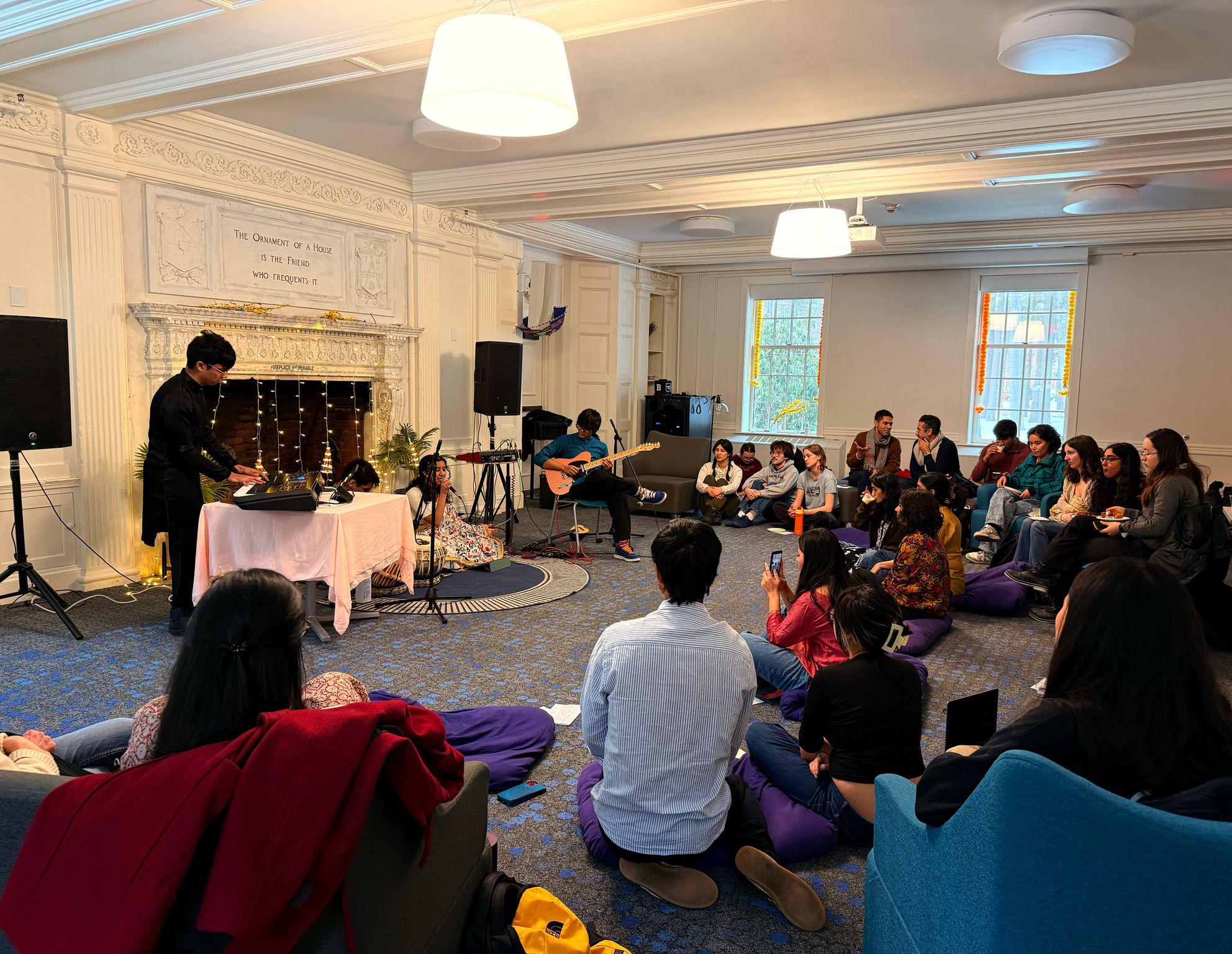South Asian Arts and Music Festival celebrates diverse South Asian cultures
February 28, 2025
 Courtesy of Zara Lall
Courtesy of Zara LallThe sounds of singing, clapping, the drumming of the tabla and the melodies of an electric guitar and piano filled Ladd’s living room last Sunday, marking the celebration of the second annual South Asian Arts and Music Festival. Students and professors, some holding samosas and lassi, gathered around student performers Sree Kandhadai ’27 and Zara Lall ’27, who were joined by the performance group Deeptha Ganesh and Friends from Berklee College of Music. The festival is a way for the South Asian Students Association (SASA) to showcase the spectrum of South Asian arts, with a special focus on South Asian classical music this year.
This year’s installment, fostering connection outside the Bowdoin community, was unique in that students from Berklee were invited to participate for the first time. Pranav Vadlamudi ’26, a SASA board member and the main organizer of the event, was excited to welcome the performers on campus.
“I think it’s great to see ways that we can burst the [‘Bowdoin Bubble’] and have people outside of campus come and showcase their talent. Music can spread so many messages. A lot of the music [Deeptha Ganesh and Friends] sang were Qawwalis, which have profound messages about spirituality and divinity, and I think that was really wonderful to see at Bowdoin,” Vadlamudi said.
Deeptha Ganesh, a Berklee student who performed on Sunday, spoke on the ability of art and music to create unique connections and communities.
“There is a lot to be said about how community is fundamental to art. It’s the community that exists in artistic, creative faces that I think is really different from any other sort of community. I think it’s very innately vulnerable—people are writing about their feelings and their emotions, whatever is important to them,” Ganesh said. “So people collaborating on music is different from collaborating on a school project or something.… There’s something extra special about that kind of connection that I think doesn’t happen elsewhere.”
Singing along to the performances also added to this sense of togetherness, said Phincho Sherpa ’25, who attended the festival.
“Even if you didn’t understand the language itself, everyone was tapping along and appreciating the rhythm and the beats and the guitars, the piano, the tabla, a combination of all that,” Sherpa said. “[Kandhadai] had us sing along to [“Enjoy Enjaami”], and I think everyone sang along. I really enjoyed it. Being able to participate in what she was singing and seeing everyone was so beautiful.”
Ganesh elaborated on the community that can be found in singing, especially in Carnatic music from southern India.
“I think with South Asian music in particular, it’s always been community driven, whether you’re looking at Carnatic music from the south of India, where it’s a lot of unison singing,… [or] where you have a kind of a lead singer, but you have a whole chorus of people responding to them,” Ganesh said. “Especially in spiritual devotional music, it’s always like you’re bringing everybody else on this journey with you. It’s not a one-way street from performer to audience. It’s more like you’re all taking this journey together, which I think is really beautiful.”
Sherpa saw this festival as a space to share the diversity of South Asian culture.
“South Asia is a very diverse place. I’m South Asian, so having other South Asian people come together and just share [parts of their culture] because … there are so many different kinds of languages, culture and traditional attire [was important],” Sherpa said. “There aren’t a lot of South Asians here in general, but if you’re trying to have people from your specific area, where they speak your own language, that’s even less. Coming together as a South Asian community,… and just having a space to talk about, appreciate and share that part with other people at Bowdoin who don’t have a South Asian identity or background, I think that was inspiring.”
Lall, also a SASA board member, read from a personal piece describing her experience at Bowdoin as someone raised in a city with a large South Asian population. She expressed a wish to have more community-oriented events such as the music festival in the future.
“Affinity groups at Bowdoin are great, and they’re great sources of support, but I think we could really benefit from doing more things that build who we are as a community, rather than large-scale general events that cater to the Bowdoin public,” Lall said. “Having that space [for culture is] so important to people who miss that, [for people] like me, who want to learn more about their culture. Being able to provide that is also so amazing, and just really rewarding.”

Comments
Before submitting a comment, please review our comment policy. Some key points from the policy: